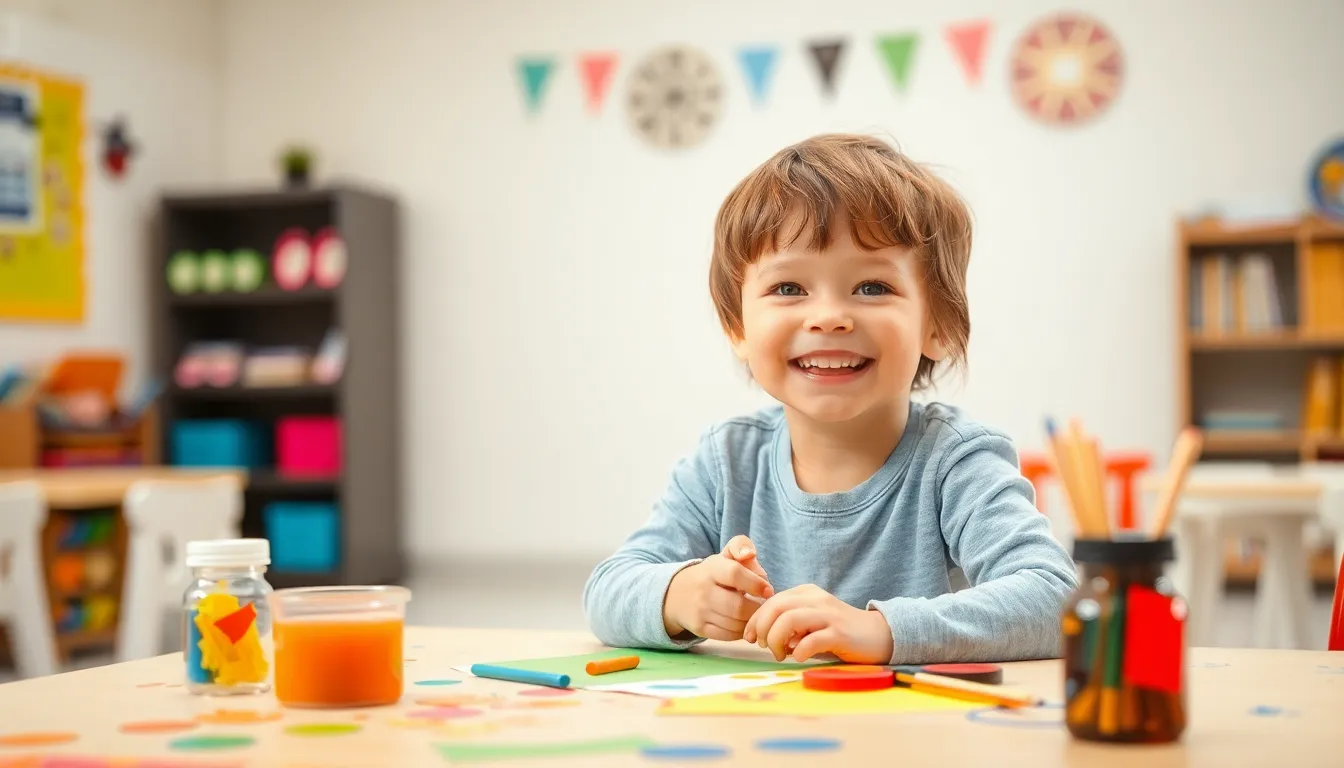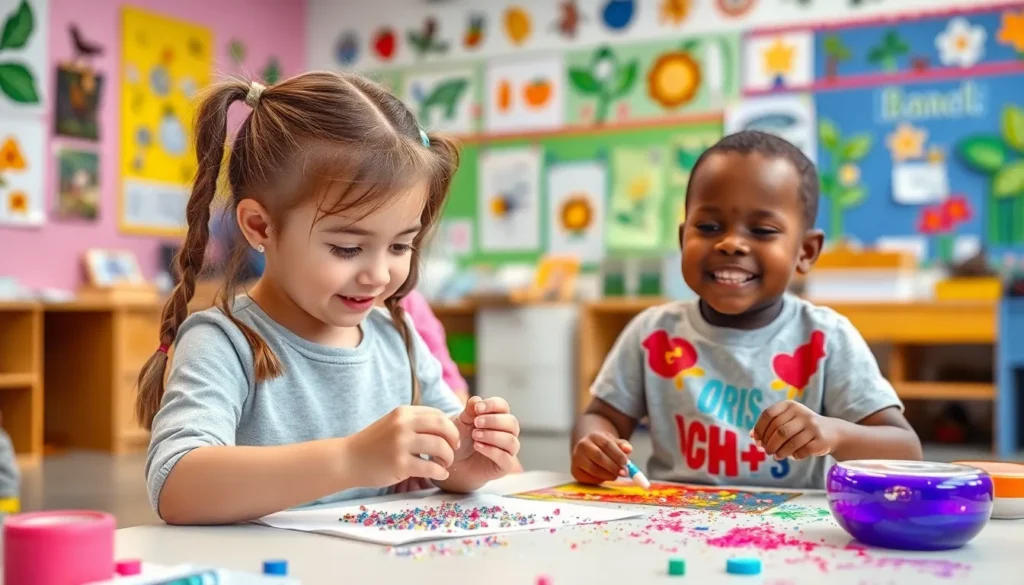Table of Contents
ToggleLooking for ways to keep your little ones engaged while sneaking in some learning? Preschool projects are the perfect solution! They not only spark creativity but also help develop essential skills like fine motor coordination and problem-solving. Plus, who doesn’t love a little mess with glitter and glue?
Overview of Projects for Preschoolers
Projects for preschoolers play a crucial role in early childhood development. Activities such as painting, building, and crafting engage young learners and stimulate their imagination. Creative exploration promotes cognitive skills and emotional growth. Children thrive when provided opportunities to manipulate various materials, including paper, clay, and natural objects.
Hands-on projects encourage fine motor skills by requiring young children to grasp, shape, and assemble items. These activities often involve cutting, gluing, or assembling, which directly enhance dexterity. Problem-solving skills also develop as they encounter challenges during project completion. Navigating obstacles fosters resilience and critical thinking.
Incorporating themes into projects can enhance engagement. For example, seasonal themes like spring or autumn can provide a basis for nature crafts or holiday decorations. Color recognition and basic counting can grow through projects that utilize numerals or vibrant hues. Integrating educational concepts within enjoyable activities keeps learning fun.
Collaboration occurs naturally when students work on group projects. Social skills such as sharing, communication, and listening blossom in these dynamic settings. Working together cultivates a sense of community, making learning more impactful.
Parents and educators can find resources online for project ideas tailored to various age groups. Websites, blogs, and Pinterest boards offer inspiration for fun and educational projects. By choosing diverse projects, adults can ensure a rich learning experience that keeps preschoolers engaged and eager to explore their world.
Benefits of Engaging in Projects

Engaging in projects offers numerous advantages for preschoolers, fostering both creativity and essential developmental skills.
Enhancing Creativity
Creative expression flourishes through hands-on projects. Activities encourage children to explore their imaginations by experimenting with various materials. They engage in painting, sculpting, and building, which allows for unique self-expression. Exploration leads to innovative thinking as they create their own designs and solutions. Opportunities arise to discuss ideas, leading to rich conversations about art and creativity. Children become confident in expressing themselves, which boosts their overall self-esteem.
Developing Motor Skills
Motor skill development is a critical aspect of preschool projects. Activities involving cutting, gluing, and assembling require fine motor coordination. Children enhance their dexterity through these tasks, improving their ability to handle everyday objects. Each project presents challenges, fostering problem-solving skills and resilience. Engaging in group activities allows for social interaction, which encourages cooperation while mastering tasks involving physical manipulation. Growth in motor skills translates to better control and confidence in personal capabilities.
Types of Projects for Preschoolers
Preschool projects encompass a variety of engaging activities that stimulate young minds. These projects support creative expression, cognitive growth, and fundamental skills.
Arts and Crafts
Arts and crafts engage preschoolers in creative expression through hands-on activities. Materials like paper, paint, and clay provide diverse options for imagination. Teachers can set up themed craft stations to promote specific skills such as color recognition. Creating collages encourages children to explore texture and layering. Simple activities like finger painting allow self-expression while enhancing fine motor skills. Additionally, making seasonal decorations fosters excitement and connection to the world around them.
STEM Activities
STEM activities introduce preschoolers to science, technology, engineering, and mathematics concepts. Building block projects teach spatial reasoning while enhancing problem-solving skills. Simple experiments, such as mixing baking soda and vinegar, showcase scientific reactions. Hands-on activities like constructing simple machines promote engineering thinking. Sorting objects by size, shape, or color enhances mathematical understanding. Outdoor experiences, such as collecting leaves, blend nature exploration with scientific inquiry.
Nature Explorations
Nature explorations immerse preschoolers in the natural world, fostering curiosity and learning. Taking nature walks encourages observation of plants and animals, prompting conversations about ecosystems. Collecting rocks or leaves for sorting activities allows hands-on engagement with materials. Creating a small garden introduces children to plant life cycles and responsibility. Art projects inspired by nature, such as leaf rubbings, develop creativity while promoting environmental awareness. Overall, these experiences cultivate a sense of wonder and connection to the environment.
Tips for Successful Project Implementation
Successful project implementation for preschoolers involves careful planning and consideration. Focusing on age-appropriate challenges helps ensure that activities remain engaging and manageable.
Age-Appropriate Challenges
Introduce challenges suitable for different age groups. For three-year-olds, simple tasks like finger painting or stacking blocks work well. Four-year-olds can tackle slightly more complex projects such as assembling basic puzzles or creating shapes with clay. Five-year-olds may enjoy building structures with larger building blocks or following step-by-step instructions for crafts. Tailoring the difficulty ensures that every child remains engaged. Observing children’s reactions can help adjust the project’s complexity when necessary.
Encouraging Independence
Promoting independence is key in preschool projects. Allow children to choose materials for their creations. Providing options fosters creative expression and decision-making skills. Encourage them to complete tasks with minimal assistance. Kids can benefit from trying to assemble items or following simple instructions. Celebrate their efforts, no matter how small, to boost their confidence. Acknowledging their capabilities cultivates a sense of achievement. Including choices in projects invites children to express their personalities.
Engaging preschoolers in hands-on projects opens a world of creativity and learning. These activities not only enhance fine motor skills but also promote problem-solving and critical thinking. As children explore various mediums and themes they develop confidence and a sense of achievement.
Group projects further enrich the experience by fostering social skills and collaboration. With a plethora of resources available parents and educators can easily find project ideas that resonate with young learners.
Ultimately these projects lay a strong foundation for lifelong learning while nurturing a child’s imagination and curiosity. Embracing the messiness of creativity ensures that preschoolers enjoy the process as much as the outcome.







